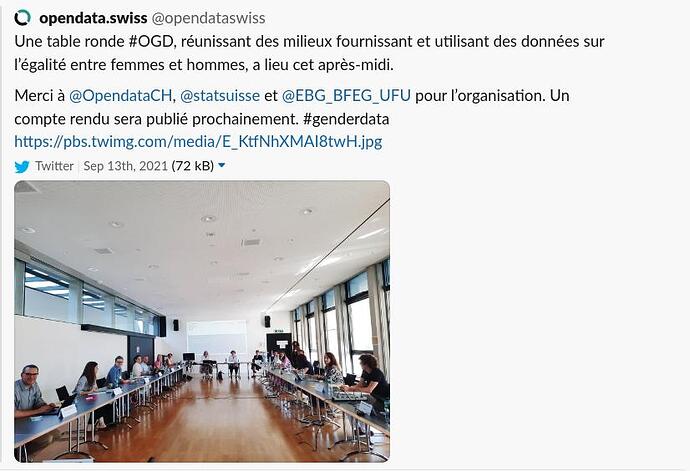What kind of data might we need to promote diversity and inclusion across more branches of society? Who should we partner with on the collection, analysis, publication and reuse of statistics - for example, on diversity of genders? And what kinds of data are most actionable in this context?
TL;DR
Want data? Share your needs here. Or jointhe thread
Have data? Upload toschoolofdata-ch/gender-gap-ch
Need support? Speak your mind atOpendata.ch/2024
The quest for gender gap data has been on the minds of people in the Swiss open data community from our beginnings - until today, as we diversify the Board of Opendata.ch and continue to update and reboot our strategy we should not lose focus on it…
Over the years, I have worked on several media projects, for the past two years also collecting research on the topic in our #diversity channel. I’d like to share the findings with you here, and thank Andreas Kellerhals for being my spanning partner throughout this time.
Screenshot of the Slack channel where I’ve been collecting the notes below - it works great as a link-dump, as long as we remember to open the content sooner or later.
In 2021, we supported the EPFL Editathons dedicated to the “celebration of diversity on Wikipedia”. The UN World Data Forum was a big topic, and we discussed the “Gender Statistics Case” as part of the Road to Bern series of events. That year we were proud to put together a diverse jury of the Prototype Fund and make this part of a strong argument in favour of sustainable, impactful projects built around open data:
While I helped run Diversity & Inclusion workshops in my local coworking space, the topic of creating a safe space and measuring how broad the participation in hackathons - or game jams, as in this paper - was often on my mind. Could we hack discrimination? Together with collagues at the Faculty of Social Work (BFH), we worked on a paper to discuss more inclusive team-building processes and started the Hack4SocialGood event series for inclusive digitalisation.
Our counterparts in the public service have always been just as aware of the subject (via twitter.com):
You can find the compte rendu and a review here:
Globally, there were I guess a hundred thousand initiatives. Here is just one: a report from Open Data Watch which has pointers for people wishing to get support on their data gathering.
We tracked the now-dormant Open Source Diversity and Inclusive Game Developer projects. Black Lives Matter seemed like a turning point, reversing Roe v. Wade a slap in the face. We dug into the UN’s comprehensive genderstat report. Found inspiration in the Disability Brief and Disability Data Advocacy projects, pointing a prosthetic finger at the common root of discrimination. On this level, I am glad to see Open Heroines and Gender Data Lab seemingly going strong.

There are many prescriptive tools and toolkits, like the one from Diversily, out there, that promise organizational improvement. How effective are they? We have already seen very well marketed initiatives splash out and die. As always with data, we need to think about the political underpinnings, consider artistic interventions, consider philosophical perspectives as well as how the question intertwines with the climate crisis and other affairs of the day. It’s great having the ability visualise global perspectives with a nice visualization, and there are some really interesting data gathering efforts:
Back in Switzerland ![]() …
…
The SRF is ready to dig into the data when and where it matters:
Tamedia does a great job with series of articles related to gender:
Which is especially great when you can find the source code to their work:
I’m sure the NZZ is doing great reporting, even instructing us how to listen to the music in the data ![]()
So where do we stand today?.. Clearly the question du jour is how gender and race is being administered to in A.I. technologies:
The ingenious Swiss startup Witty Works is probing deeply to find out what LLMs tell us about our prejudices:
While the ‘woke’ / anti-gender topics are part of an alarming discriminatory trend in wider society, according to Republik:
I feel like at this point we have gotten a bit off topic. Or have we? Should we stop talking about diversity data, and “start talking about equity” [data]? This TEDx talk comes recommended from my friends Fabienne, Chris & Sunita in Bern, who are the unconsciousbias.ch consultancy:
In the 10 years since the OKCon 2013 round table, we have learned a lot, spoken a lot. I truly hope that people of all genders, races, and backgrounds have been able to derive some benefit from better access to data & the open tools to transform it into actionable information. I hope that you will join this conversation - online, or in person at next year’s (un)conference: Opendata.ch/2024 Forum – Opendata.ch
Be strong out there, and resist the bias.


